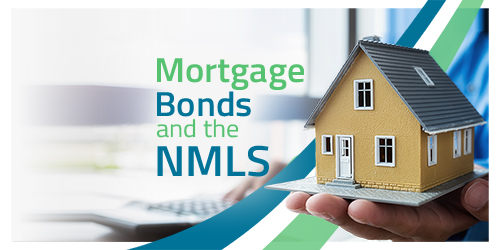Get Your California Mortgage Bond
$50,000 Bond
$50,000 Bond
$25,000 Bond
$50,000 Bond
Can't find what you need?
Let our bond experts help!
Get Started »
No obligation, takes 2 minutes
If you'd prefer, call us at
Who is Required To Purchase a California Mortgage Broker Bond?
All mortgage professionals are required to purchase a surety bond:
- Mortgage lenders
- Mortgage brokers or originators
- Mortgage lenders and servicers
A mortgage lender is responsible for providing the loan and in many cases servicing the loan if they keep it on their books. A lender can elect to act as a broker.
A mortgage broker, also called a mortgage loan originator, is responsible for helping consumers find the best mortgage product to meet their qualifications and requirements.
A mortgage servicer and be an independent company not involved in either writing the loans or brokering them.
The California Department of Real Estate Law (CRMLA) is not a broker license, but if you're licensed under CRMLA, you can provide brokerage services to your borrowers.
Again, all of these license classifications are required to purchase a mortgage broker bond.
Get Your Bond Pricing Today
You can get pricing for the California mortgage surety bond you need today. Click the button below. You need to know the amount of your bond.
Need Help? Call Us Today
Talk to a bond specialist today. They will help you find the surety bond you need and get you the lowest possible price. 1-800-608-9950
Why is a California Mortgage Bond Required?
The California Department of Financial Protection & Innovation is responsible for the licensing requirements mortgage lenders and brokers must meet.
This licensing process is a list of standards, examinations, and experience requirements a lender and/or broker must meet to legally do business in California.
And even with these licensing standards in place, every year there will be a handful of mortgage professionals who purposefully:
- Approve a borrower for a loan they can't afford
- Help a borrower get approved for a loan by providing false information
- Hinder borrowers from getting approved by providing false information
- Pushing borrowers to high commission loans to make more money
- Creating and charging false fees
If a mortgage professional is found guilty of any fraudulent action, the customer can recoup some or all of the financial damage by making a claim against the mortgage surety bond for compensation. However, the claim can only go up to the amount of the bond.
What Are The California Mortgage Broker and Lender Bond Amounts?
Mortgage Brokers
Mortgage brokers (or originators) have a bond amount starting at $50,000. This is the minimum even if you're a new business and have yet to sell a single mortgage.
This bond amount will change based on the dollar volume of mortgage loans being written:
| Mortgage Loan Amount | Bond Amount |
|---|---|
| $0 to $50,000,000 | $50,000 |
| $50,000,001 to $500,000,000 | $100,000 |
| Greater than $500,000,000 | $200,000 |
In California, individual mortgage brokers do not purchase their own bond. The mortgage company or employing brokerage purchases the bond to cover all brokers based on the companys total lending dollar amount.
Remember this bond amount is the maximum amount of financial coverage available to your customers. The bond amount will affect the price to purchase the bond.
How Much Does a California Mortgage Broker Bond Cost?
The price of a mortgage broker bond and mortgage lender bond is determined by a rate, quoted from a surety.
A surety is an insurance company responsible for underwriting the bond.
And this is where you can save hundreds of dollars when you purchase your bond. Every surety will conduct their own internal assessment of an applicant based on these primary factors:
- Personal credit of the individual or business owners
- Mortgage and lending experience
- Prior bond claims if the individual or owner has been licensed in the past
These rates will be different from surety to surety and this is where you can save hundreds of dollars by working with a specialized surety agency like Surety Bonds Direct to buy a surety bond.
As an agency, we work with multiple A rated sureties allowing us to price shop for you and find the lowest price.
Once you get your pricing, you're under no obligation to purchase. This is free information you can use to plan. Plus all quotes are good for 30 days.
There's no reason to request your free quote right now or call a bond specialist at 1-800-608-9950.
Mortgage Broker Bond Price Examples
Let's look at the $50,000 bond amount for mortgage brokers.
Pay attention to the rates and how one percentage point can make huge difference in the price.
| Bond Amount | Premium Rate | Total Cost |
|---|---|---|
| $50,000 | 0.5% | $250 |
| $50,000 | 1.0% | $500 |
| $50,000 | 1.5% | $750 |
| $50,000 | 2% | $1,000 |
| $50,000 | 2.5% | $1,250 |
| $50,000 | 3% | $1,500 |
Example pricing is great, but you can get your exact price with no risk or obligation to purchase within one business day.
Go request your price quote today. Remember, this is free information for you. There's no obligation to purchase. Remember, quotes are good for 30 days.
How To File Your Mortgage Broker or Lender Bond?
After you agree to a price, purchasing your bond is as easy as completing an online checkout form.
The entire mortgage licensing process is managed by the National Multi-State Licensing System (NMLS).
Once your payment is processed, our issuance team will immediately begin the process to issue your bond with the National Multi-State Licensing System.
We provide you with detailed instructions to help us file your bond. The process takes only a few minutes.
How Long Does a California Mortgage Broker Bond Last?
The California Department of Financial Protection & Innovation requires an active surety bond on file with the NMLS to legally conduct business.
Every mortgage broker bond has a bond term or 12 months from the effective date, which is a date you choose when you want the bond to become active.
As you4 bond's expiration date approaches, you need to renew the bond. Be aware, your bond's renewal date will most likely not coincide with your license renewal date.
How Do You Renew a Mortgage Broker and Lender Bond?
Renewing a mortgage broker and lender bond is easy. As your bond expiration date approaches, your bond specialist will contact you 30 to 45 days in advance to ensure you don't miss paying the renewal premium.
Your bond specialist will have renewal pricing already quoted allowing this process to get finished with little headache or effort.
All mortgage bonds are continuous. This means once you pay your renewal premium, your bond remains active. You don't have to do anything extra.
Get Your Bond Pricing Today
You can get pricing for the California mortgage surety bond you need today. Click the button below. You need to know the amount of your bond.
Need Help? Call Us Today
Talk to a bond specialist today. They will help you find the surety bond you need and get you the lowest possible price. 1-800-608-9950
Mortgage Bonds And Getting Your California Business License/Registration
All licenses are issued through California's Residential Mortgage Lending Act (CRMLA), which is an alternative to licensing through the California Financing Law or the California Department of Real Estate Law.
The NMLS has a good breakdown of the licensing process, but here is a brief overview of each step.
Limited Offering Exemption Notice
You must provide evidence that you're company has complied with the filing requirements of the Corporations Code Section 25102.
Customer Authorization for Disclosure of Financial Records
You must submit the Customer Authorization for Disclosure of Financial Records form.
Make sure the business name on this form matches exactly with the name of your business as it's filed with the Secretary of State. Plus the signature must be from an individual listed as a direct owner or Executive Officer.
Fingerprint and Background Check
Every owner, member, director, trustee, or general partner must submit:
- A Notice of Officers form
- Request for Live Scan Service form
- If you don't have access to Live Scan, you must mail a copy of the Notice of Officers form and a fingerprint card
- Payment of $20 for each Live Scan or $62 for processing of a fingerprint card
California's rules for what an owner or member is differs from the NMLS rules. California requires this step for any person who directly or indirectly owns 10% or more of the business.
Purchase the Mortgage Broker Surety Bond
See above and click here to see the purchase cards.
Outline the Organizational Chart and Management Chart
You must upload a chart or outline showing the percentage of ownership for:
- Direct owners (10% or more)
- Indirect owners (10% or more)
- Subsidiaries and affiliates of the applicant
You must also provide a management chart identifying the name and title of the:
- Directors
- Officers
- Managers
The chart must also outline the compliance reporting and internal audit structure.
Identify The Qualifying Individual
You must identify a qualifying individual. This is the person responsible for supervising and periodically review the activities of the branch manager or branch managers. The Qualifying individual supervises each branch if there are multiple branches.
Business Formation Documents
Provide the appropriate documents for the formation of your type of business structure whether it's a:
- Sole proprietorship
- Unincorporated association
- General partnership
- Limited Liability Partnership
- Limited Partnership
- Limited Liability Limited Partnership
- Limited Liability Company
- Corporation
- Not for Profit Corporation
- Trust
Provide All Required Documentation
There's a lot of documentation you'll need to submit. The following are the written statements confirming your company has the appropriate procedures in place.
- Consumer complaints
- Timely onboarding of loans
- Oversight of Sub-serviers
- Trust accounting
- Per Diem Interest
- Compliance with California Homeowners Bill of Rights
- Location of where your financial books are located
The following are documents you must submit with the license application:
- Evidence of federal agency approval (FHA, VA, Fannie Mae, Freddie Mac, Ginnie Mae, or Farmers Home Administration)
- Certificate of Authority and Good Standing
- Financial statements
- Other registered trade names
Business Plan
You must also provide your companies business plan including the:
- Type of license you're applying for: lender, servicer, or lender and servicer
- Type of business actions you'll conduct under this type of license
- Operating structure
- Marketing strategies (making sure to follow the advertising regulations)
- Products and services offered
- Target markets
- Credit decisions and thresholds
- How the flow of funds will work
- Load and processing process
- Sale of loans
- Affiliate or subsidiary relationship if any
- Sub-servicer contract
Make sure you pay attention to the application process because this document has a specific structure and titling convention.
Anti-Money Laundering and Bank Secrecy Act Policies
This is a policy you will implement that includes the annual testing of these procedures by an independent third party.
Get Your Bond Pricing Today
You can get pricing for the California mortgage surety bond you need today. Click the button below. You need to know the amount of your bond.
Need Help? Call Us Today
Talk to a bond specialist today. They will help you find the surety bond you need and get you the lowest possible price. 1-800-608-9950

What is a Mortgage License Bond or MLO Surety Bond?
Getting a mortgage broker, lender, or servicer license requires a license bond or mlo surety bond. Learn what this bond is and how to purchase it fast.

How to Become a Mortgage Broker
Becoming a mortgage broker can be a fun and highly fulfilling career.

Mortgage Broker Bonds & the NMLS
Find out about the NMLS filing process which most often utilizes e-filed bonds instead of traditional printed paper documents.
Can't find what you need?
Let our bond experts help!
Get Started »
No obligation, takes 2 minutes
If you'd prefer, call us at


